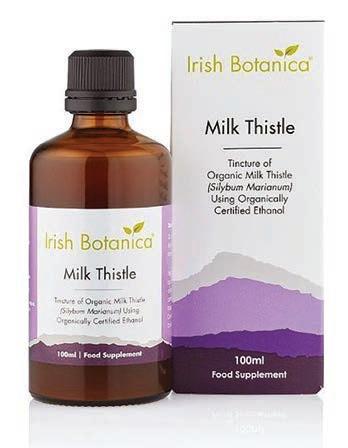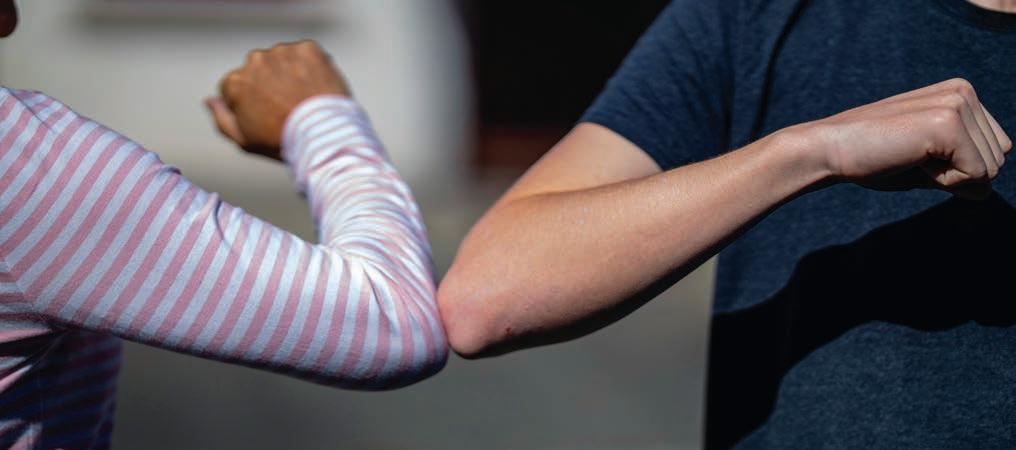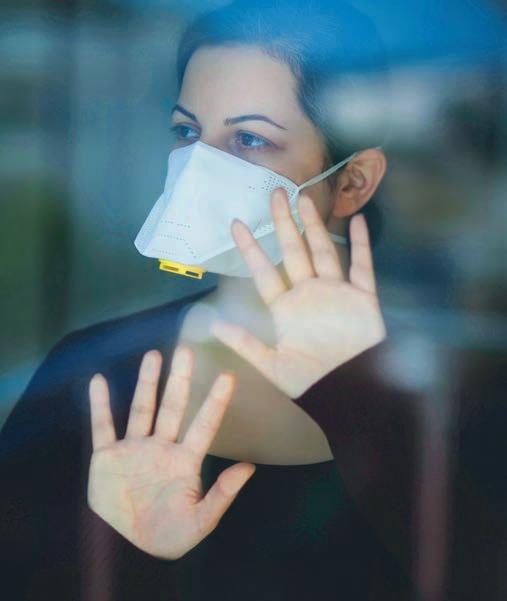
23 minute read
Marianne Heron
Let’s have more of that inward gaze...
AS I SEE IT
Advertisement
MARIANNE HERON
What do I wish for this new year? Well, it’s nothing tangible and it has to do with something Carl Jung said: “Who looks outside dreams, who looks inside awakes.”
In a culture where we spend our time racing around in answer to external demands it’s a thought-provoking statement. It was echoed by the late Gerry Robinson in a recorded programme on RTE’s Nationwide recently. e Irish born businessman spoke about the way that the pandemic had helped us understand the importance of “being a bit more inwards”.
It was a focus that the retired business executive and former chairman of Granada TV was practising himself, painting landscapes and using the carpentry he learned from his father to make garden seats for the beautiful grounds he created around his Donegal home Oakville. at inwardness, drawing on his imagination and creativity, had clearly brought Gerry ful llment. e magic of inwardness turns up in all kinds of places. While in Todi, a glorious hilltop town in Umbria a few years ago, I went to visit the Casa Dipinta, (the Painted House.) is is the extraordinary second home of artist Brian O’Doherty and his wife, the art historian Barbara Novak. e kitchen/ living area is painted with vibrant pastel representations of the Ogham alphabet. Upstairs vivid geometric designs represent times of the day and trompe l’oeil views.
Brian returns to Todi each summer during the annual August festival there from his New York base. When back he climbs a rickety ladder to add to his unique interior design. Brian, born in 1928 in Ballaghadreen, Co. Roscommon, and who has lived in New York for over 50 years, is a striking example of someone who, in later life is vital, refuses to allow age to con ne him to stage, appearing much younger than his years. What keeps him evergreen is a passion rooted in creativity: one that gets him out of bed in the morning to continue contributing and, yes, to climb ladders aged 93. e great thing about that inward look to imagination is that the resulting creations in all kinds of forms reach outward to others, o ering uplifting experiences for everyone to enjoy in all kinds of settings. It’s something that Irish people have a gift for, especially in literature, theatre and music where that interior world of imagination, no matter where the individual is located, results in works which reach all over the world and down through the centuries. ink of James Joyce, far from home in Trieste, conjuring the Dublin life of Leopold Bloom in Ulysses.
But imagination can result in all kinds of other experiences. Just to mention a few: to cheer these dark nights there is the Wild Lights tour of iconic sights around the world at Dublin Zoo and a magical Lightscape with an Alice in Wonderland theme created with recycled lightening at Lough Crew estate in the Boyne Valley. Brightening the streetscapes is the New Ross walls project with vibrant paintings with Norman themes, while Waterford has wall art with Viking themes. And in the Observer’s home there was the 2021 Kilkenny Catwalk Art trail: all projects to boost civic pride and a sense of heritage.
Listening in to reactions during lockdown there were clues about the way people were looking inwards and were surprised to nd themselves happy, busy with things they loved doing: writing, painting, cooking, designing, or as one musician put it: “engaging with my muse.” And that can be the side of ourselves it’s all too easy to touch with in our highpressurise lifestyles.
Don’t let’s lose that inward gaze, let’s have more of it.
Loving your liver
CLAIR WHITTY

THE liver is a major organ in the right side of the body. It has many functions; it removes toxic substances and waste products from the blood. It breaks down insulin and other hormones. It produces Cholesterol which we need a certain amount of to survive. Glycogen is stored in our liver and is broken down into glucose when it’s needed by the body for energy. Bile is produced in the liver and contains bile acids which are important to aid the breakdown of fat. The liver also plays an important role in carbohydrate, protein, amino acid, and lipid metabolism. A number of vitamins are stored in the liver including: vitamin A, D, E, and K. These are only some of the functions our liver carries out.
This time of the year many of you will be thinking about supporting your liver after the recent period of indulgences. Here are some things you can do; eat foods that support the liver including beetroot, carrots, green leafy vegetables, and blueberries. Things that put stress on the liver making it work harder are medication, in particular paracetamol. As well as alcohol, binge drinking, and high fructose foods.
Supplements and herbs can help your liver. Milk Thistle is one of my favourites. Many supplements contain Milk Thistle so how do you choose one?
This is how I decide. If you want to do a bit of a clean-up and support the main organs of detoxification, I would choose Flor Essence a cleansing herbal tea blend of eight herbs. This contains Milk Thistle, Red Clover, Burdock Root, Turkish Rhubarb, Slippery Elm, Kelp, Sheep Sorrel, and Watercress. All to help support the organs of elimination, the liver, skin, colon, and the lymphatic system. Take 50ml 1-2 times daily, preferably before breakfast and before bedtime. I take this one every year. If you have been on a lot of medication, or have drunk a lot of alcohol, have hormone imbalance, digestive issues, or stubborn constipation, I would take Irish Botanica
Milk Thistle. This comes as a liquid and is a potent form of Milk Thistle. It has been taken as a trusted
“folk” supplement for generation. Take 20 drops twice per day in water.
Your liver is a wonderful organ that acts silently on your behalf. Let’s start loving it today.
Natural Health Store, Market Cross Shopping Centre, Kilkenny Phone: 056 7764538 Email: info@ naturalhealthstore.ie Shop online: www. naturalhealthstore.ie
Resolve yourself to restart your promise in february
ANDREW MCDONALD HYPNOTHERAPIST
How is your resolution for 2022 coming along? Many of us make promises to ourselves for the New Year. Few of us keep them going for very long.
Most resolutions don’t last much beyond the rst two weeks of January. I’m not hazarding a guess by saying that, it’s fact. Research has found that around 17 days into the New Year, the majority of people have either given up or are seriously agging.
You may be full of good intentions when the bells chime midnight on 1st January. ese may be enough to keep you going for the rst fortnight or so but then willpower starts to deplete and determination takes a di erent direction.
Actually it’s no wonder this happens. First, many of us are exhausted after Christmas. Secondly, it can seem that there isn’t much to look forward to. True, there’s a little bit of a stretch in the evenings but we’re still living in darkness for most of the day. irdly, and perhaps most importantly of all, that cheer and goodwill we felt over the festive season is gone. ere’s no doubt after the January 1 celebrations, positivity takes a nosedive, particularly as the black nights of winter are no longer brightened by a thousand multi-coloured bulbs. We’re edging closer towards Spring but not that you’d notice.
Perhaps it should come as no surprise then that experts recommend starting, or perhaps restarting, resolutions in February. For a start, it’s the shortest month of the year. Even a few days di erence can alter how we perceive our rst target, getting a page of the calendar under our belts! Once we’ve done that, it can really make a massive change to our con dence in continuing.
February is also a month of rebirth. Yes, it’s still cold and the days short, but they are starting to noticeably lengthen. Spring has started to show it’s rst signs too. You may be able to nd some snowdrops starting to show close to your home, hear birds chirping, nd frogspawn in a nearby pond. In short, February is a time of new life in a way January is not. Use this fact to allow nature to give you a helping hand.
By starting in February, you’re also avoiding competition. If you’re agging with your resolution towards the middle of January, it’s almost certain that you know someone, perhaps fond of boasting, who tells you they’re ying with theirs. Maybe they are, maybe they’re not. You don’t need that though as it is likely to leave you feeling like a failure that you’re not nding your life change a breeze. Begin (again?) in February and you cut all that nonsense out! (Re)starting your resolution in February has great bene ts. You’re much more likely to succeed. As an old proverb says; “you only fail when you stop trying”.
Community Group
Mission development


NICHOLAS LESNIAK
e past months at “Twilight Youth Inclusion Club Kilkenny”, have been full of development and great joy. e youth club has become a popular recreation destination for the Youth of Kilkenny. Interesting and useful workshops have been created and many projects have been accomplished. Youth Development is one of the key pillars of Twilight Youth Inclusion Group and all the club’s members along with the amazing sta are doing their absolute best to nourish it.
WORKSHOPS
e members of Twilight Youth Inclusion Group Kilkenny had a chance to part-take in various workshops created by their Youth Leaders. Dogotherapy was a marvellous beginning to the Youth Club. It showed us the importance of integration and understanding with each other and other living things. Our Fantastic host – Dagmara, planted a seed of ambition and excitement in our members. We learned about the correct treatment of animals and dogs in particular. We had a chance to explore the dog’s behaviour and body language. It was certainly an amazing experience that we hope to reiterate in the future. Shortly after the workshop we began our rst major project. “Twilight Youth Podcast”, is a completely independent and individual project created by our youth. Topics and themes of each audition will be chosen by the club’s members committee on behalf of two representatives (Junior and Senior). Our members had the chance to test their mechanical and verbal skills during a special workshop. Everyone had a chance to operate the cameras, record the audio and even become directors. It was an amazing day full of education and amusement. As our sign of acceptance, understanding and inclusion we created a LGBTQA+ Inclusion Workshop during “Stand Up Week 2021”. Our members created a wonderful poster to spread their tolerance towards the “Rainbow Community”. It was an extremely important step for our youth club.
TRIP TO KBOWL KILKEN NY
e Youth Leader’s of Twilight Youth Inclusion Group Kilkenny along with the dogotherapy tutor Dagmara organised a trip to KBowl Kilkenny for our youth to positively mark the end of the Dogotherapy workshop. e bowling experience was the main highlight of the evening. e winners were delighted and the losers were dissatis ed but had a chance for a come back on the gaming machines. e positive atmosphere was perceptible in the air. Dagmara was presented with owers, a symbolic present and a certi cate of appreciation by the club’s members along with Nicholas – the Youth Leader. Dagmara is a truly amazing woman. ank you for everything. ment at Twilight Youth Inclusion Group Kilkenny. We have interesting and useful workshops planned. 2022 will be a year of exciting and unexpected collaborations. We have reached an agreement with the Order of Malta for a Basic First Aid Course. e members will receive an o cial certi cate after the completion of the course. Other aspects of everyday life will also be touched on during our workshops. Finance is one of the most important pillars of our lives. is is why we will be introducing a Financial secretary role in our youth club. e Financial Secretary will be picked by our members using the democratically system of voting. Local and abroad trips are planned for the year also. We hope to go on a planned trip to France to mark the end of the youth club year. e details of this trip will be discussed in the future. e future for our youth club is bright. We will do our best to keep our star shining. e Future of Twilight Youth Inclusion Group Kilkenny is appealing, and the goals are to be achieved. Our Development is equal to the development of our members. We will still constantly share the importance of inclusion, acceptance and development. ese are the pillars of our club, and our duty is to nourish and present the importance of these pillars to the youth community. We will continue to create a safe environment for our youth to develop into the people that they aim to be as they are our future. Our Youth is our future!
SPECIAL REPORT


EU in further moves to curb content of big tech giants


THE European Union has taken a significant step towards passing legislation that could transform the way major technology companies operate, requiring them to police content on their platforms more aggressively and introducing new restrictions on advertising, among other provisions.
The legislative arm of the 27-nation bloc has voted overwhelmingly to give initial approval to the sprawling regulations set forth in the landmark Digital Services Act.
The legislation is the most aggressive attempt yet to regulate big tech companies as the industry comes under greater international scrutiny. It could serve as a model for lawmakers in the United States who say they, too, want to rein in the businesses’ digital practices.
The European Parliament and Council of the European Union — the bloc’s legislative bodies — are expected to debate the contents of the legislation for some months before voting on a final version.
The version just approved will force companies to remove content that is considered illegal in the country where it is viewed, which could be Holocaust denials in Germany or racist postings in France.
And it would significantly shape how big tech companies interact with users, allowing them to opt out of targeted advertising more easily and prohibiting companies from targeting advertisements at children.
“With the [Digital Services Act] we are going to take a stand against the Wild West the digital world has turned into, set the rules in the interests of consumers and users, not just of Big Tech companies and finally make the things that are illegal offline illegal online too,” said Christel Schaldemose, the centre-left lawmaker from Denmark who has led negotiations on the Bill.
The latest vote was the culmination of months of debate among the parliament’s nearly 700 elected members.
Members had considered including a provision that would have completely banned targeted advertising — the practice of using information collected from users’ browsing history to tailor ads to them. They decided instead to give users the ability to opt out of certain types of tracking by changing a setting on their browsers. Currently, European websites ask users what types of tracking they would like to disable each time they visit.
The legislation will also ban companies from employing deceptive tactics known as dark patterns to lure users to sign up or pay for services and products. And it would allow users to ask companies which personal characteristics, such as age or other demographic information, led them to be targeted with certain advertisements.
Google spokesman Karl Ryan said the company would examine the legislation to understand its impact.
“We share the goal of [parliament] to continue to make the Internet safer for everyone and this vote on the DSA clears the way for a final agreement later this year, something we support,” he said.
Facebook did not immediately respond to a request for comment.
Internet users are paying closer attention to technology practices, according to Gianclaudio Malgieri, associate professor of technology and law at the EDHEC Business School in France and the co-director of the Brussels Privacy Hub, and the reputations of some large companies have been battered.
Companies such as Facebook and Google had started to improve some of their advertisement and privacy practices, Malgieri said. But the European legislation would hold them more accountable.
“For the first time, it will not be based on what Big Tech decides to do,” he said. “It will be on paper.”
European policymakers have been far more aggressive than their U.S. counterparts in taking on the power and privacy practices of tech giants.
The bloc’s General Data Protection Regulation, which took effect in 2018, is one of the world’s strongest privacy laws. It has influenced tech companies’ data collection practices around the globe.
Gaming’s the new buzz for the 2020s
IF the 2010s were the decade of social media in the tech industry, there’s reason to think the 2020s are the gaming decade.
Last week Microsoft said it planned to buy the gaming giant Activision Blizzard — maker of the Call of Duty, World of Warcraft and Candy Crush franchises, to name a few — for some $69 billion. If it survives antitrust scrutiny, the deal will make Microsoft, which already owns Xbox, Minecraft and Halo, a titan of the gaming world. And that in turn could give it a big role in shaping not just how we work and play but how we interact online.
Games have been a big industry for a long time, from Nintendo and PC gaming in the 1990s to PlayStation and Xbox in the 2000s, to the rise of mobile gaming in the 2010s. But in recent years, leaps in technology and innovations in gameplay have made them ubiquitous, from addictive smartphone time-killers to deeply immersive, consolebased worlds that let millions of players interact in real time.
And then came the pandemic, which supercharged the popularity of games even as they pushed more of our work and social lives into cyberspace. e better and more popular games get, the less they start to look like a niche entertainment medium and the more they start to look like the future of the Internet.
It’s not just the number of users but how they’re using those games. Increasingly, games such as ‘Fortnite’, ‘Roblox’ and ‘World Of Warcraft’ serve not just as places to complete quests and shoot bad guys but places to hang out. ‘Fortnite’ hosts massive live concerts attended by millions; ‘Roblox’ invites you to build your own games and experiences and invite your friends; ‘Warcraft’ was a pioneer in encouraging players to make friends, chat and work together in guilds.
ese three are not outliers. ey’re just some of the better-established examples of a trend that is fast becoming the norm. ese days, teens are as likely to hang out on Discord or Xbox Live playing video games together as they are to interact on Instagram or Snapchat. Kids who aren’t old enough for a Facebook or Instagram account can socialise on Roblox, which is played by nearly 50 million people per day, most of them young. at convergence of gaming and socialising is part of what has tech CEOs and investors frothing about the Metaverse, a buzzword cribbed from sci- that is being marketed as the next generation of the Internet.
“Gaming is the most dynamic and exciting category in entertainment across all platforms today and will play a key role in the development of metaverse platforms,” Microsoft CEO Satya Nadella said in announcing the Activision deal.
Trials begin on Omicron jab
PFIZER and BioNTech have started clinical trials for a reformulated vaccine to protect against the Omicron coronavirus variant. e rise of the Omicron variant has forced vaccine makers to reassess the e ectiveness of their vaccines.
Data has shown that booster doses of the P zer-BioNTech vaccine were e ective at neutralising Omicron. But just two doses of it were far less e ective against the new variant.
“While current research and real-world data show that boosters continue to provide a high level of protection against severe disease and hospitalisation with Omicron, we recognise the need to be prepared in the event this protection wanes over time and to potentially help address Omicron and new variants in the future,” said Kathrin Jansen, P zer’s head of vaccine research and development in a statement. e trial will involve up to 1,420 participants across the three cohorts.
One of the groups will receive two doses of the companies’ COVID vaccine, another will receive two doses and a booster dose of their vaccine, while the last will receive the Omicronbased vaccine.
P zer and BioNTech said it planned to manufacture four billion doses of the vaccine in 2022 and said that would not change even if an adapted vaccine was required.
P zer is also developing a vaccine in pill form.

Get vaccinated or pay up now is the norm in many countries
MORE governments are o ering people a stark choice: Get vaccinated or pay up.
Austria’s lower house of parliament has approved a coronavirus vaccine mandate for all adults starting February 1, with violators facing as much as €4,000 in nes.
In Greece people older than 60 who decline the vaccine can be ned €100 a month. Italians who are older than 50 must also get vaccinated or face nes and suspensions from work, beginning next month.
In Canada, meanwhile, the hard-hit province of Quebec said it was considering a plan to impose a “signi cant” nancial penalty on adults without at least a rst dose of coronavirus vaccine.
“ ese people put a very important burden on our health-care network, and I think it’s normal that the majority of the population is asking that there be a consequence,” Quebec Premier François Legault said at a news conference.
Early data from Quebec, Greece and Italy appears to show that announcing these measures contributes to an immediate uptick in vaccinations. But scientists and rights groups warn that they could come at a cost, potentially alienating skeptical people and fuelling distrust.
European countries, in particular, have tightened restrictions on unvaccinated residents in an e ort to vaccinate holdouts and curb the spread of the fastmoving omicron variant.
“ is is how we can manage to escape the cycle of opening and closing, of lockdowns,” Austrian Health Minister Wolfgang Mückstein told his country’s parliament. e chamber’s approval paves the way for Europe’s most far-reaching vaccine mandate. Starting in midMarch, police will demand proof of vaccination, and people who cannot provide it may be ned as much as €650. ose who ignore reminders to get vaccinated and contest their penalty could be forced to pay several thousand dollars. ose who are pregnant, have valid medical excuses or have recovered from the coronavirus in the previous six months will be exempt. Austria will also allocate nearly €1.5 billion to e orts to encourage vaccination.
In Greece, revenue from the new nes will go to the health system, the government said.
When the mandate was announced in late November, 520,000 Greek citizens older than 60 were unvaccinated. Since then, 220,000 of them have received their shots or made an appointment, according to the Greek health ministry. Now, 90% of people older than 60 are vaccinated. e Italians announced a vaccine mandate in early January as Omicron surged. Less than 10% of the population was unvaccinated as of January 18, according to the Italian health ministry, but unvaccinated people occupied two-thirds of intensive-care beds and 50% of other beds in Italian hospitals.

How we’ll live with an endemic
WORLD wide, coronavirus experts share their belief that we will have to learn to live with Covid-19, they are highlighting one of the less-familiar terms in the pandemic glossary: endemic. ousands who ‘followed the rules’ are getting covid. ey shouldn’t be ashamed.
“We have seen now that this is likely to become an endemic disease here in the United States and really around the world,” Rochelle Walensky, director of the US Centres for Disease Control and Prevention, said during an appearance on MSNBC. “We have many diseases that are endemic, in uenza being one of them, that cause us minor challenges year after year that we can handle and tackle, and that may very well be what happens with covid.” is doesn’t mean that the pandemic is close to being over — many parts of the world are still experiencing elevated case counts, hospitalisations and deaths driven by the highly contagious omicron variant. And, experts said, even if and when Covid-19 becomes endemic, we won’t likely be able to return to our carefree, pre-pandemic lives.
Still, the word endemic is “a helpful concept, and it certainly provides some context as to where we are in this horribly unfortunate journey,” said Jacob Lemieux, an infectious-disease physician at Massachusetts General Hospital. e issue, however, is nuanced, he said.
Albert Ko, Chair of the Department of Epidemiology and Microbial Diseases at the Yale School of Public Health, agreed. “ is is not a situation where you have a ip of the switch, like, we’re pandemic one day and then we switch to endemic.
“ is is a gradual process and this is the process that we’re undergoing now,” Mr Ko said.

When working 9 to 5 may no longer work
THE traditional idea of going to the o ce ve days a week or working 9 to 5 may be dying. Some companies are making room for more creative and exible approaches to getting workers to do their jobs.
Zoom, which many workplaces and workers relied on during the pandemic, is starting to allow its more than 6,000 workers to choose whether to work in the o ce, work remotely, or go hybrid, as in working remotely a certain number of days a week or month at their choosing.
Workplace communications platform Slack is reimagining its o ce primarily as a gathering place for meetings and projects. And tech giants Amazon and Salesforce, which have many employees in Ireland, are allowing their employees to decide as a team when and where they should work, based on the projects at hand.
ese approaches come as companies rethink workplace policies amid the fast spread of the Omicron variant and the ‘Great Resignation’, where many employers in the US and in Europe are nding it more di cult to retain talent.
As with any big change, companies that don’t take a measured approach to implementing their policies could unintentionally exacerbate employee inequity.
For example, if a company asks employees to pick two days in which they’ll work from the o ce, the result could be that some employees never get the opportunity to work together. It also may not be conducive to employees’ work, which may need more or less collaboration days. And it could ultimately make the workplace less equitable if managers let face time play a role in evaluations.







